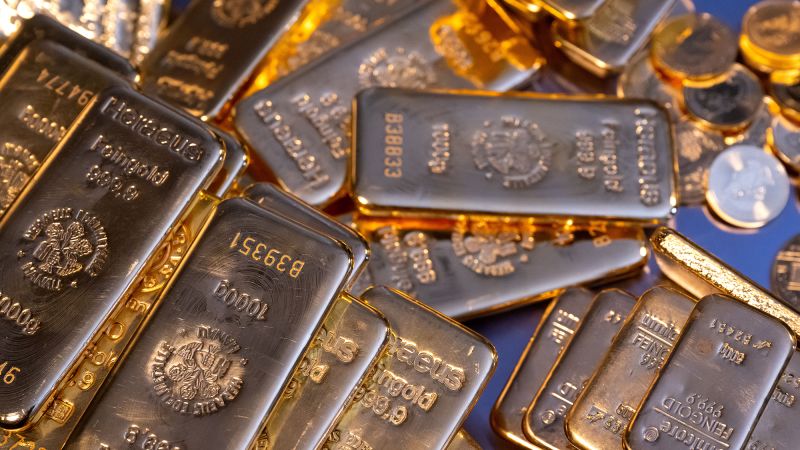Gold prices hit an all-time high Monday, buoyed by growing expectations of interest rate cuts among investors, a weaker dollar and geopolitical tensions.
Prices for the yellow metal jumped as much as 3% in Monday trade to reach $2,135 per ounce, rising above the previous record of $2,072 notched in August 2020. Prices later fell on the day to trade at $2,023 by 11.57 a.m. ET.
In recent weeks, investors have grown increasingly confident that the US Federal Reserve has successfully reined in inflation through aggressive interest rate hikes, and may start to cut borrowing costs as early as March next year.
Higher interest rates push up the yields on assets such as US Treasuries, drawing in investors.
But, when interest rates are low, falling or — as in this case — expected to fall, demand for Treasuries ebbs, and gold, which doesn’t pay out any interest, becomes relatively more attractive.
The yield on the benchmark 10-year US Treasury bill has fallen from a 16-year high of 5% reached in mid-October to stand at 4.3% Monday.
“The expectations of the end of the tightening cycle have been priced in, pushing longer-term yields lower,” Daria Efanova, head of research at trading platform Sucden Financial, wrote in a note Monday. “This has created a more favorable environment for gold as a non-yielding asset.”
John Reade, a market strategist at the World Gold Council, an association of gold producers, told CNN that, with investors predicting several rate cuts over the next year, gold prices could “quite possibly” shoot above Monday’s record high.
Those rate predictions have also weighed on the US dollar, again making gold more appealing. Higher interest rates tend to boost the value of a currency by attracting more capital from abroad into the country, and the reverse is true when rates fall.
The dollar slumped 3% last month against a basket of six major currencies. Since gold is priced in US dollars, the fall in the greenback’s value has made it less expensive for investors outside the United States to buy the metal, which should have boosted demand and, in turn, lifted gold prices.
Over a longer timeframe, gold has benefited from another factor: A deep sense of global unease. JPMorgan CEO Jamie Dimon has said this may be the most dangerous time the world has seen in decades.
Investors typically see the metal as a safe haven since it is a tangible, scarce asset that, in theory, holds its value. Gold prices have risen 10% so far this year.
“The geopolitical risk environment appears to have changed,” Reade said. “Not just (because of) Russia invading Ukraine, not just the terrible things going on in Israel and Gaza, but trade tensions between the US and China, concerns about what will happen in the South China Sea, concerns about what China will do in Taiwan.”
A more fractured, febrile world has encouraged central banks in emerging markets to stock up on the precious metal, Reade noted. In addition, policymakers in those countries, spooked by the freezing of the Russian central bank’s foreign exchange reserves in the West, have piled into gold as an alternative store of value that they perceive to be safer, he added.
According to the World Gold Council, central banks in emerging markets bought 473 metric tons (521 tons) of gold a year on average between 2010 and 2021. But last year, they bought 1,100 metric tons of the metal and, in the first three quarters of this year, 800. That breakneck pace of purchases “could continue for years, if not decades,” Reade said.
Close to a quarter of all central banks said in a survey published in May that they planned to increase their gold reserves in the next 12 months.
“Concerns about the shaky global economic backdrop and the Israel-Hamas conflict have fueled investor demand for safe-haven assets like gold,” Victoria Scholar, head of investment at Interactive Investor, said in a note. “Plus, expectations for Fed rate cuts next year have put downward pressure on the US dollar… adding to gold’s attractiveness.”
Read the full article here




